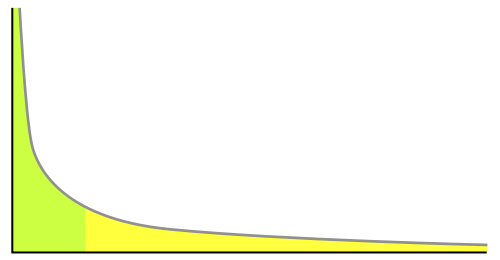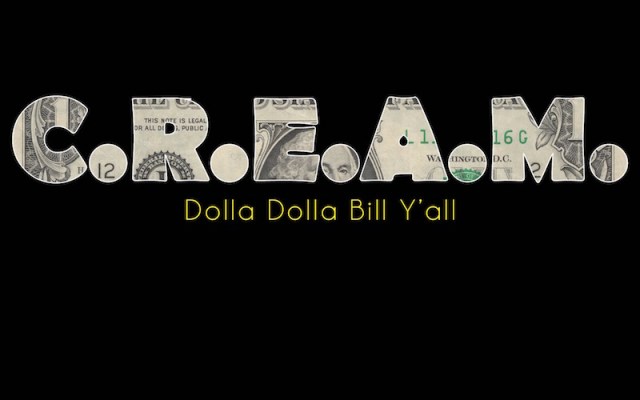We live in a time of great polarization. Politically, in nations across the world, both the left and the far right grow more numerous, and draw further away from the mainstream establishment, every year. Economically, the rich continue to separate themselves from the poor, as the very rich do from the rich. And in tech, of course, we increasingly live in a “winner-take-most” world.
Last year, Quartz reports, 48% of Americans self-identified as “lower class,” up from 35% in 2008; meanwhile, according to the New York Times, “the top 20 percent of the income distribution is also steadily separating itself — by geography and by education as well as by income.”
Winner takes most. Economic gains go disproportionately to the now-infamous 1%; what’s left over goes disproportionately to the top 20%. It’s like we’re all collectively moving from Mediocristan to Extremistan; from a more (so-called) “normal” distribution of wealth to something more like a power law:

(Image by Hay Kranen / PD)
Meanwhile, across the political spectrum, people are spending so much time in filter bubbles mediated by Facebook and Google that Politico warns “Google Could Rig the 2016 Election” while Trevor Timm of the Freedom of the Press Foundation asks: “You may hate Donald Trump. But do you want Facebook to rig the election against him?”
As the always brilliant Ben Thompson observes:
on the part of Facebook people actually see — the News Feed, not Trending News — conservatives see conservative stories, and liberals see liberal ones […] liking opinions that tell us we’re right instead of engaging with viewpoints that make us question our assumptions.
He quotes Ezra Klein, in Vox, re a study of 10,000 American adults:
It’s tempting to imagine that rising political polarization is just a temporary blip and America will soon return to a calmer, friendlier political system. Don’t bet on it. Political polarization maps onto more than just politics. It’s changing where people live, what they watch, and who they see — and, in all cases, it’s changing those things in ways that lead to more political polarization
…And, of course, all online news follows a power law as well.
Polarization is even reshaping — and amplifying — the fringes of political belief, by boosting conspiracy theories, according to Fast Company. Facebook claims polarization isn’t their fault, and that’s basically true; it’s an emergent property of human nature, accidentally midwifed, not the outcome of anyone’s conscious malevolent decision.
One can’t help but wonder if this unexpected political redistribution is one reason why both the pundits and the pollsters have been so wrong of late. Look at FiveThirtyEight.com, the heroes of 2012. Of late they look like soothsayers reading entrails. I’m not just talking about the rise of Trump; last year their predictions of the UK’s general election were terribly wrong.
This is all driven, at least in part, by technology. The winner-take-most world of software — if your software is better, it quickly eats the world faster than others, without being limited by geography, distribution limitations, or other hardware constraints — accelerates economic polarization. Facebook’s filter bubbles accelerate political polarization.
The conventional wisdom is that this is a terrible thing. I’m not so sure. I’m opposed to the polarization of wealth, ever-increasing inequality, until and unless Extremistan generates sufficient wealth that even the poor benefit more than they would in Mediocristan — but I can least imagine a world where that is so. (In particular, a world where we can afford to implement a universal basic income for everyone.)
As for political polarization — yes, it fragments communities and pits neighbors against one another, but it still seems a whole lot better than a media controlled by a narrow, blinkered establishment whose fundamental goal is to perpetuate itself and its self-serving views.
A polarized world is also one in which previously unthinkable viewpoints can be seriously proposed, vigorously argued, and accepted by the majority with astonishing speed. (Remember when legal marijuana and gay marriage seemed like distant, unachievable goals?) It’s a world prone to more conflict, but also more and faster change; high-risk, high-reward. That’s a tradeoff that I for one am tentatively, optimistically, willing to accept.
